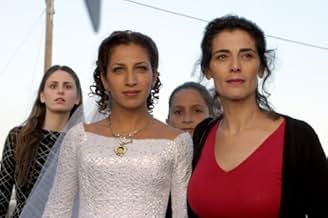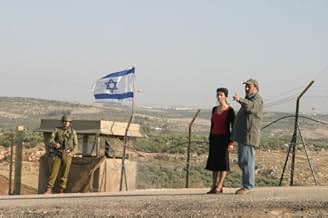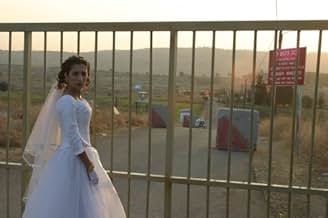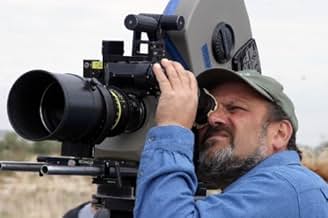Füge eine Handlung in deiner Sprache hinzuIn Majdal Shams, the largest Druze village in Golan Heights on the Israeli-Syrian border, the Druze bride Mona is engaged to get married with Tallel, a television comedian that works in the ... Alles lesenIn Majdal Shams, the largest Druze village in Golan Heights on the Israeli-Syrian border, the Druze bride Mona is engaged to get married with Tallel, a television comedian that works in the Revolution Studios in Damascus, Syria. They have never met each other because of the occup... Alles lesenIn Majdal Shams, the largest Druze village in Golan Heights on the Israeli-Syrian border, the Druze bride Mona is engaged to get married with Tallel, a television comedian that works in the Revolution Studios in Damascus, Syria. They have never met each other because of the occupation of the area by Israel since 1967; when Mona moves to Syria, she will lose her undefi... Alles lesen
- Auszeichnungen
- 8 Gewinne & 15 Nominierungen insgesamt
- Amal
- (as Hiyam Abbass)
- Hammed
- (as Makram J. Khoury)
- Marwan
- (as Ashraf Barhoum)
- Evelyna
- (as Evelyne Kaplun)
- Amin
- (as Adnan Trabshi)
- The Mother
- (as Marlene Bajjali)
- Simon
- (as Uri Gabriel)
- Joseph
- (as Robert Hoenig)
Empfohlene Bewertungen
"The Syrian Bride" was a surprise. Directed with honesty by Eran Riklis, who also co-wrote the screen play with Suha Arraf, the film takes no sides between one faction, or another. In many ways, the movie seems to be sympathetic toward the Druze family, but in no way it felt preachy, or frankness in its presentation of what goes on in that troubled part of the world.
The family at the center of the story is not a happy one. The father, Hammed, has been in prison for his pro-Syrian views. He has also estranged himself from his two sons, Hattem, who has married a Russian doctor and now lives abroad and Marwan, a businessman of sorts, based in Italy. The oldest daughter, Amal, a sensitive woman, has a troubled marriage herself to a man who can't understand her need to assert herself and go to college. It is a male dominated society where women don't seem to have much to contribute except have children and be housewives.
Most impressive in the film is Hiam Abbass, an actress we have admired from her previous work, notably, "Satin Rouge" and "Paradise Now". She has a quiet way of getting under the skin of the role she is playing; this woman shows such dignity in her work that it's hard to take ones eyes from her once she is on the screen. Makram Khoury is seen as the patriarch, Hammed. Clare Khoury is also effective as the bride who must leave family and friends to go to another world. Eyad Sheety and Ashraf Barhom play the two brothers.
"The Syrian Bride" is a satisfying film by Eran Riklis, a talented director who shows great sensibility toward the material.
The intended couple, however, is not the focus as much as the family dynamics that become ignited by the wedding. The patriarch is Hammed, a political activist on probation, and he has two sons - Hattem, who has been cast out by the conservative religious cabal for leaving the country and marrying a Russian woman, and Marwan, who provides the comedy relief as a womanizing salesman. The glue of the family, however, is provided by eldest sister Amal, who defiantly stands up to the men in her family and wants to get her bachelor's degree in Haifa. The first hour deals mainly with the standard pre-wedding confusion, though it happens to take place on the same day that Syrian President Bashar al-Assad succeeded his father, but the last half-hour takes place entirely at the Israel-Syria border crossing where the officials from both countries refuse to cooperate with a negotiating Red Cross worker in allowing Mona to enter Syria.
With its primarily somber tone, this is no Middle Eastern derivative of "My Big, Fat Greek Wedding", but Riklis and co-screenwriter Suha Arraf supply genuine warmth toward the characters and bring immediacy and credibility to the personal situation at hand. The acting is solid with Hiam Abbass the standout as Amal. There are nice turns by Makram Khoury as Hammed, his real-life daughter Clara as Mona, Eyad Sheety as Hattem and Ashraf Barhom who steals scenes as the gap-toothed Marwan. Special mention should be made for Michael Wiesweg's expert cinematography which perfectly captures the mostly sun-baked terrain. This is a case where the 2006 DVD package from Koch Lorber is invaluable for the context it provides to the movie's story. The making-of featurette, an extensive interview with Riklis and his accompanying commentary all help considerably in understanding the political situation that both drives and reflects the wedding preparation complications. Also included is the original trailer as well as the U.S. version.
Mona (Clara Khoury), a young Druze bride is to be wed to Syrian TV-star Tallel (Derar Sliman) from Damascus, a man she has never met. Since neither country recognizes the other diplomatically, once the bride crosses the border to Syria, she will never be allowed to return to Israel and her wedding day, usually a day of great joy, may be one of her saddest. While the film tells us much about the sad realities of the political fragmentation in the Middle East, it is also a story with social and cultural ramifications. Mona's sister Amal (Hiyam Abbas), whose expressive face frames the film's beginning and end, is stuck in an unhappy marriage. She wants to attend Haifa University but is thwarted by her husband Amin (Adnan Trabshi) who is afraid of losing face in the village and of relinquishing "control".
Mona's father Hammed (Makram Khoury), a pro-Syrian agitator known to Israeli police, is forbidden to travel to the Syrian border to say goodbye to his daughter. He harbors resentment and refuses to welcome his son Hattem (Eyad Sheety) and his Russian wife home from Moscow because he broke family tradition and moved away eight years ago. Another son, Marwan (Ashraf Barhom), a businessman, is welcomed by the family but is rejected by an angry former girlfriend, a French Red Cross worker (Julie-Anne Roth), who works in the village. Mona's character is mostly symbolic and she has little to say, yet the story of the film is written on her face and her lack of dimensionality is more than compensated for by the depth of the supporting characters, particularly Hattem and Amal.
As these conflicts bubble under the surface, the situation becomes increasingly absurd as the wedding is threatened by bureaucratic intransigence on the border checkpoints between Israel and Syria. Mona's passport has an Israeli stamp on it and, according to Syrian regulations, anyone carrying a passport with an Israeli stamp is denied entry to Syria. Neither Israeli nor Syrian customs officials seem to know what to do and the prospective bride and groom are stuck in a no-man's land, reduced to communicating via bullhorns pressed against locked gates. The Syrian Bride may sound like an exercise in absurdity bordering on farce, yet for the family who may never see their child again, it is a drama of high seriousness. Whether you consider The Syrian Bride to be an allegory, black comedy, family drama, or political statement, the image of a girl sitting alone in a white wedding dress stuck between impenetrable barriers is one that remains.
The story takes place on the wedding day of a beautiful bride, a Druze woman in Majd Alshams, a pro-Syrian village located in the conflicted Golan heights (factions pro-Syrian and pro-Israeli live uncomfortably in Druze villages). Our bride is to marry (by arrangement - she has never met him) a Syrian TV soap opera celebrity. The problem arises in that this will be the last time that she sees her family as once she crosses the border into Syria accepting Syrian citizenship, she can never return to the Golan Heights to see her family. The wedding is further complicated by the return visit of her brother who has been away for 8 years having married a Russian by whom he has a son: the brother and the son are in conflict. And to make things worse, the paperwork at the border to allow the bride to join her husband to be in the wedding is held up by political paperwork. How all of these factors impact the bride's future is played out by the families on both sides.
The script tries to make the story seem credible but to those of us who still don't understand the intricacies of the territorial parceling of that area of the world or the traditions of Arab marriage etc, this plot seems ponderous and heavy. The actors are all excellent and there is something in each character with which we can identify. A little background on customs before the film begins would have helped immensely as the movie itself is very well done. Grady Harp
Wusstest du schon
- WissenswertesMakram Khoury and Clara Khoury are father and daughter in the film as well as in real life.
- PatzerMona's father says he has raised her for 25 years. However, she states her birth date as November 30th 1976 and the movie is set on July 17th 2000. That would make her only 23 years old.
- VerbindungenFeatured in The Making of The Syrian Bride (2005)
- SoundtracksBride Theme
Music Composed & Conducted by Cyril Morin
Performed by Bulgarian Symphony Orchestra-Sif 309
Top-Auswahl
- How long is Syrian Bride?Powered by Alexa
Details
- Erscheinungsdatum
- Herkunftsländer
- Offizielle Standorte
- Sprachen
- Auch bekannt als
- Syrian Bride
- Drehorte
- Produktionsfirmen
- Weitere beteiligte Unternehmen bei IMDbPro anzeigen
Box Office
- Bruttoertrag in den USA und Kanada
- 380.505 $
- Eröffnungswochenende in den USA und in Kanada
- 7.235 $
- 20. Nov. 2005
- Weltweiter Bruttoertrag
- 1.522.967 $
- Laufzeit1 Stunde 37 Minuten
- Farbe
- Sound-Mix
- Seitenverhältnis
- 2.35 : 1
Zu dieser Seite beitragen

































